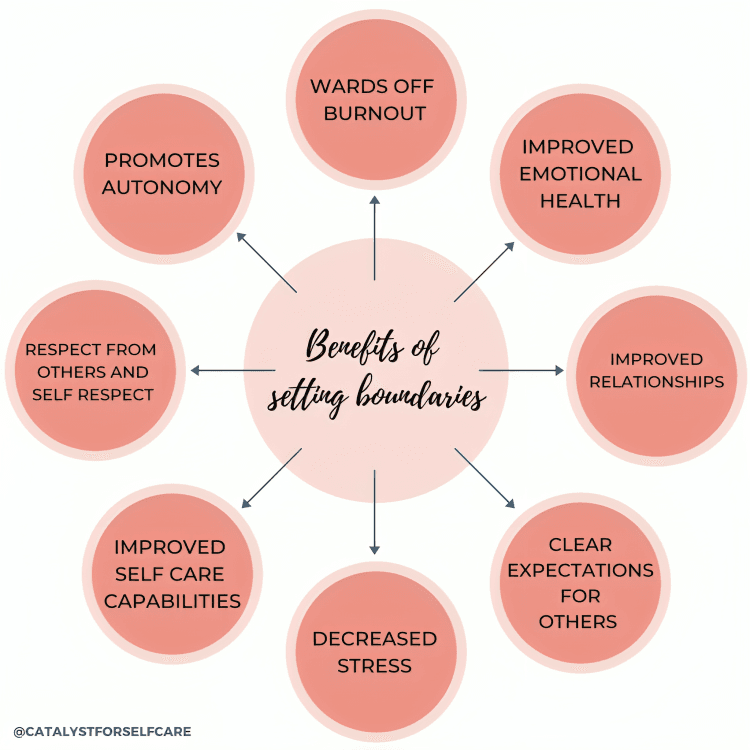
“
Setting healthy boundaries in relationships is essential for emotional balance, mutual respect, and personal growth. Clear boundaries prevent misunderstandings and protect your well-being. Learn how setting healthy boundaries can transform your connections for the better.1
1
”
Setting boundaries in relationships helps define emotional space, ensuring that both people feel respected, heard, and valued without sacrificing personal identity or becoming overwhelmed by each other’s needs. 1
Clearly defined personal limits prevent emotional burnout. They allow individuals to protect their energy, communicate needs effectively, and maintain long-term connections without feeling drained or taken for granted. 2
When boundaries are respected, trust naturally grows. Both individuals learn they can rely on each other’s honesty, and this mutual understanding lays the foundation for deeper emotional intimacy over time. 3

Creating personal boundaries reinforces self-worth. It tells others that your emotions, time, and comfort matter, helping to foster relationships based on mutual admiration, not guilt, pressure, or obligation.
Physical and emotional boundaries are essential in romantic relationships. They protect both individuals’ comfort levels, build consent-driven intimacy, and support a healthier and more respectful dynamic between partners. 4
Boundaries help friends balance closeness with independence. They make room for personal growth while ensuring neither party feels smothered, overwhelmed, or pressured to always be available or agreeable. 5
Boundaries can prevent toxic dynamics from forming. When people set limits early, it becomes easier to identify manipulation, gaslighting, or controlling behavior before it becomes emotionally damaging or lasting. 6
Setting boundaries creates space for personal growth. When you define your needs and say “no” when necessary, you gain time and clarity to focus on goals and self-improvement independently. 7

Saying “no” without guilt is a boundary in itself. It shows confidence, reduces emotional exhaustion, and communicates clearly that your needs matter just as much as anyone else’s.
Boundaries provide emotional clarity. They prevent confusion by outlining acceptable behaviors and reactions, helping both parties stay on the same page and avoid unnecessary tension or repeated conflicts. 8
Setting limits around digital communication is important. Constant texting or calling can cause stress, and defining expectations helps maintain a healthy balance, reduce anxiety, and encourage quality over quantity. 9
In friendships, boundaries prevent overdependence. They allow both people to seek support without expecting the other to act as a constant therapist, fixer, or always-available source of emotional comfort. 10
Healthy boundaries require self-awareness. You must first understand your emotional and physical needs before you can communicate them clearly, ensuring others can respond with respect, not confusion or frustration. 11
Boundaries support equality in relationships. They discourage one-sided patterns, where one person gives too much and the other takes too much, keeping the dynamic balanced, healthy, and mutually respectful. 12
Boundaries can evolve with time. As relationships grow and change, so do individual needs. Regularly reassessing limits ensures that boundaries remain relevant, helpful, and supportive of each person’s well-being. 13

Boundaries protect mental health. They create emotional distance when needed, shield against manipulation, and reduce stress by ensuring their values, time, and emotional energy are not being misused.
Boundaries promote emotional safety. When both people know what’s off-limits and what’s appreciated, the risk of hurtful words or actions decreases, encouraging a more secure, caring, and stable bond. 14
Setting boundaries with family or close friends may feel uncomfortable, but it’s necessary for maintaining personal agency, preventing guilt-driven choices, and ensuring emotional interactions stay healthy and supportive. 15
Boundaries in romantic relationships help regulate conflict. By defining limits on how disagreements are handled, such as avoiding yelling or taking breaks—you protect emotional safety and mutual respect. 16
Consistently honoring your own boundaries teaches others to respect them. Inconsistency confuses people, but when you follow through firmly, your needs are seen as non-negotiable. 17


